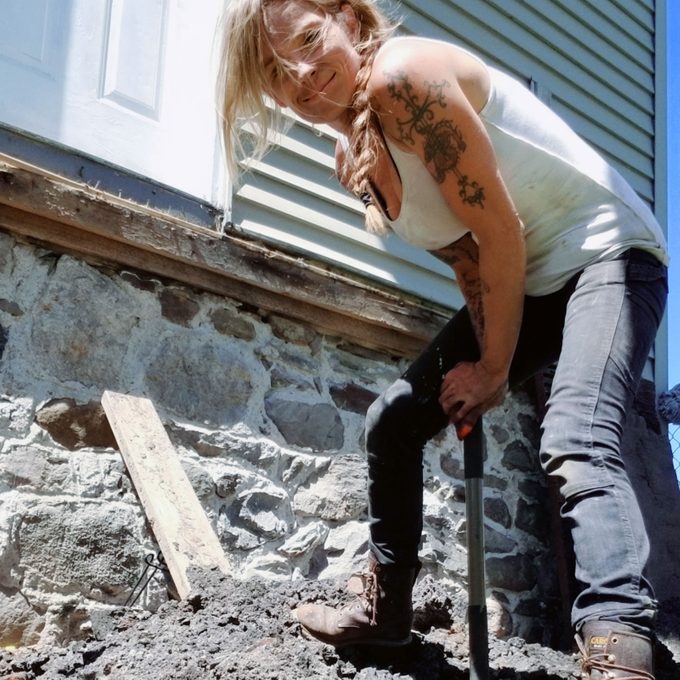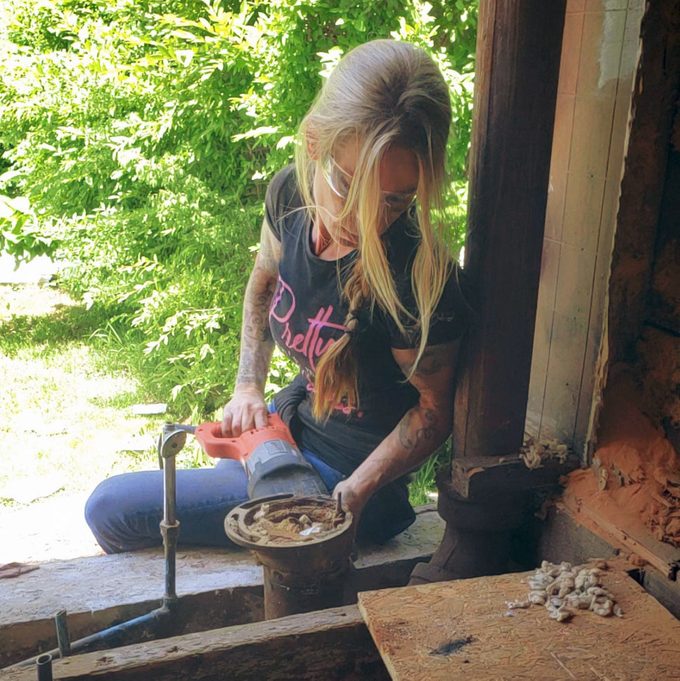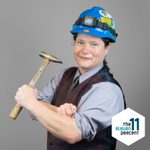The Eleven Percent: Meet Kelly Gannon, Contractor

Kelly Gannon talks about the joy of working with her hands, the pitfalls of unequal pay and what it's like digging into a 350-year-old Colonial.
Our editors and experts handpick every product we feature. We may earn a commission from your purchases.
This FH series spotlights the women and nonbinary tradespeople who make up 11 percent of the construction workforce in America. Know someone we should feature? Email us here.
Kelly Gannon was an industrious teen. She earned money babysitting, shoveling snow and laboring in restaurants, but also joined her brothers repairing things for her family’s landlord. Then, in her early 20s, she realized she could make better money in construction.
“All of the guys my age were roofing, and I wasn’t afraid of heights or tools, so I said, ‘Put me up there,’ ” Gannon says. She found a contractor who obliged and trained her. “Then I gradually moved from the roof, down into the house, learning everything along the way,” she says.
After fifteen years in the industry, she started Kreate Construction, specializing in residential repairs and remodeling in northeast Massachusetts. “I couldn’t see myself doing anything else,” she says.
As @kreateconstruction on Instagram, she encourages other tradeswomen across industries to share tips and tricks, and encourages others to enter the trades.
We asked Gannon for her thoughts on the state of contracting and the construction industry.
Q: How did gender bias set the stage for starting your own company?
A: I was training a male co-worker how to [put up siding] when I found out he was making a lot more money than me, even though I had more experience.
I was pretty frustrated, so I asked the contractor for a raise. He did give me my raise, but it wasn’t a lot. He had assured me he would help me attain my contractor’s license, but when I asked for help, he refused. I was fired shortly after.
Before then, I’d never considered owning my own company, but I knew I still had to work and feed my kids. So that’s how Kreate Construction came about. People started coming to me with jobs, and it catapulted from there.
Q: How are you enjoying running a company, seven years later?
A: It’s exhausting. It’s 24-7. There’s always an email or something that has to be ordered. After the pandemic, I switched gears to keep it on a smaller level.
Most of the time now, I’m doing a lot of the field work myself, with just a guy or two to help out. I don’t want to have a big company. I just want to do what I love. I like working with my hands, and until I physically can’t do that, I don’t see myself coming out of the field.
It’s also challenging today because personalities are more polarized. Plus, DIY networks and social media have created unrealistic expectations. On TV, a remodel is done in three weeks with no hiccups. No one sees the fifty workers running in when the camera’s off. For some clients, that sets a challenging stage to give them what they think they should be getting.
I feel the same about social media for young girls. It sets this expectation that we’re supposed to perfect and pretty all the time, but that’s not real life.
Q: What are some of your more memorable projects?
A: Actually, the one I’m on right now is my favorite, but also one of my most challenging, physically and mentally. It’s an exterior remodel of a 1600s Colonial house in Ipswich [Massachusetts], which was moved across town in the 1800s, then had a tree fall on it. It leans horribly, and another contractor made a mess of it about twenty years ago.
I’m having to go back to old-school techniques. Throw away the levels, and instead string lines across the front to try to get a nice plane. I have jacked up houses with no worries. But just to add some siding and windows on this one, I’m having to hone my skills, think outside of the box and get creative to reach the final destination.
But it’s great. I like challenging jobs, which means I work on a lot of period houses. I’m the person who takes the projects that nobody wants. It can be a lot of work and frustrating, but it’s also super rewarding to fix the problems and transform it from that ugly house that’s falling apart to the nice house on the block.
Q: How does Instagram fit in with your business and career?
A: I don’t use it for getting customers, but rather to network with other trades. I’ve met so many great tradeswomen on Instagram; plumbers, painters, steelworkers and electricians from all over the world.
A group of us actually started the Tradeswomen of Instagram page to highlight some of them. Most of the time, we don’t interact with other women in the field, so it’s nice to not feel alone and have other women to network with.
Q: What challenges do you see coming in the industry?
A: Labor. We have to figure out a way to get kids involved again. For so many years, everybody was pushing for college, college, college, and maybe that kept more young people from entering the trades.
There’s a need for women, especially, because we’re such a big, untapped labor pool. We need to start soliciting more girls when they’re in high school, putting them in shop class and seeing if they like it. There’s so much women can do on a construction site, and not all of it requires being physical and dirty.
Q: What’s your advice for young women considering the trades?
A: Don’t underestimate yourself. You’ll be surprised at what your abilities are. You can crush it. In daily life, try to do things yourself instead of saying you can’t do it, or expecting someone else to do it for you.
Also, be confident going in. It’s OK to ask questions and to be uncomfortable. But you have to be confident in your ability to learn, because the rest of your skills will come from that.
And when it comes to something like equal pay, know your worth and open your mouth. It’s easy to be afraid to say something, but you have to speak up for yourself. You always have to speak up for yourself.
Q: Do you find anything challenging or beneficial about being a woman in your field?
A: Owning a business, I used to have a lot of anxiety because I really needed to sell each job. There were a few customers who tried to take advantage of me financially, I imagine because they perceived me as the weaker sex. But you just have to roll with it.
I’m at the point now where I’m comfortable and confident, and it’s working. But I still sometimes feel like I have to work twice as hard to prove that I’m capable.
As far as benefits, we’re very detail oriented. Working in residential construction, that’s a big deal.
Earlier in my career, I was teamed up with a male coworker who was like a bull in a china shop. He was so strong and fast, he would just smash the work out. Then I would get sent in to clean it up, make it look good, and do the final touch ups to make customers happy. So that’s the benefit of a woman in construction: We pay attention and we’re detail oriented.
Q: What are your pro-specific tools?
A: That’s a tough one because I have a lot of tools, but one of my favorites is actually my tool belt itself. I have a Diamondback Cavetto that was a prototype for their women’s model. They found me on Instagram and I helped with the design, so of course I love it.
I used to have to drill holes in men’s belts to get the waist small enough to fit me, and then they were uncomfortable, heavy and always hurt my hips. It’s nice the industry is starting to evolve and recognize that women are in the trades.
Then I have a titanium Martinez M4 hammer. For years I swung a steel one, and my arm was always so tired. This one is so light, I don’t even feel like I’m working with it. Plus, Mark Martinez actually sent me a custom pink one. The first. So it’s slightly special to me!
I would be remiss not to talk about my Keen Utility work boots, which are one of the most important tools I use every day. Keen has been an amazing company to deal with, and they have really stepped forward for tradeswomen.
Finally, the most comfortable work pants? Truewerk. And they’re really developing their women’s line. The T2s are the most versatile through the seasons.
Kelly Gannon Bio
Kelly Gannon started in the trades more than twenty years ago. She thought it would be a good way to support her sons as a single mom, and that proved to be true.
Today she is a licensed contractor and owns Kreate Construction in Massachusetts. Her projects range from full renovations to quick fluff-and-buffs, and the most important work: repairs. While she loves to make things pretty, there’s no sense in it if that leak destroys a freshly painted wall.
Writer Karuna Eberl Bio
Karuna Eberl is a regular contributor to FamilyHandyman.com. She spent the last 25 years as a freelance journalist and filmmaker, telling stories of people, nature, travel, science and history. Eberl has won numerous awards for her writing, her Florida Keys Travel Guide and her documentary The Guerrero Project.





